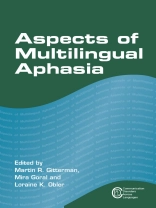This volume provides a broad overview of current work in aphasia in individuals who speak more than one language. With contributions from many of the leading researchers in the field, the material included, both experimental work and theoretical overviews, should prove useful to both researchers and clinicians. The book should also appeal to a broader audience, including all who have an interest in the study of language disorders in an increasingly multicultural/multilingual world (e.g. students of speech-language pathology and linguistics). The areas of multilingual aphasia addressed in this collection include assessment and treatment, language phenomena (e.g. code-switching), particular language pairs (including a bidialectal study), and the role of cultural context.
Inhaltsverzeichnis
Introduction – Martin R. Gitterman, Mira Goral, and Loraine K. Obler
Part 1 – Broad Considerations
1. The Study of Bilingual Aphasia: The Questions Addressed – Loraine K. Obler and Youngmi Park
2. Bilingual Aphasia: Neural Plasticity and Considerations for Recovery – Daniel Adrover-Roig, Karine Marcotte, Lilian C. Scherer, and Ana Ansaldo
Part 2 – Assessment and Treatment
3. What Do We Know About Assessing Language Impairment in Bilingual Aphasia? – Swathi Kiran and Particia M. Roberts
4. Morphological Assessment in Bilingual Aphasia: Compounding and the Language Nexus – Gary Libben
5. The Clinical Management of Anomia in Bilingual Speakers of Spanish and English – Maria L. Muñoz
6. Generalization in Bilingual Aphasia Treatment – Kathryn Kohnert and Michael Peterson
7. Cross-Language Treatment Effects in Multilingual Aphasia – Mira Goral
8. Language Deficits, Recovery Patterns and Effective Intervention in a Multilingual 16 Years Post-TBI – Daly Sebastian, Usha Dalvi, and Loraine K. Obler
Part 3 – Bilingual Language Phenomena
9. Bilingual Aphasia and Code-Switching: Representation and Control – Alessandra Riccardi
10. Grammatical Category Deficits in Bilingual Aphasia – Yasmeen Faroqi-Shah
11. Language Choice in Bilingual Aphasia: Memory and Emotions – Carmit Altman, Mali Gil, and Joel Walters
12. Acquired Dyslexia and Dysgraphia in Bilinguals Across Alphabetical and Non-Alphabetical Scripts – Maximiliano A. Wilson, Karima Kahlaoui, and Brendan S. Weekes
Part 4 – Language Pairs
13. Morphosyntactic Features in the Spoken Language of Spanish-English Bilinguals with Aphasia – José G. Centeno
14. Nonword Jargon Produced by a French-English Bilingual – Nicole Müller and Zaneta Mok
15. Number-Processing Deficit in a Bilingual (Chinese-English) Speaker – Nancy Eng
16. A Case Study of a Bidialectal (African-American Vernacular English/Standard American English) Speaker with Agrammatism – Jean E. Jones, Martin R. Gitterman, and Loraine K. Obler
Part 5 – Cultural Context
17. Aphasia, Language, and Culture: Arabs in the U.S. – Reem Khamis-Dakwar and Karen Froud
18. Towards Cultural Aphasiology: Contextual Models of Service Delivery in Aphasia – Claire Penn
Über den Autor
Loraine K. Obler, Ph.D. is a Distinguished Professor at the CUNY Graduate Center, with appointments in both Speech-Language-Hearing Sciences and Linguistics, as well as at the Harold Goodglass Aphasia Research Center of the Boston University School of Medicine. She has co-authored articles and books on her areas of interest: neurolinguistics, bilingualism and the brain, cross-language study of aphasia, and language in aging. http://web.gc.cuny.edu/speechandhearing/faculty/lobler.asp












